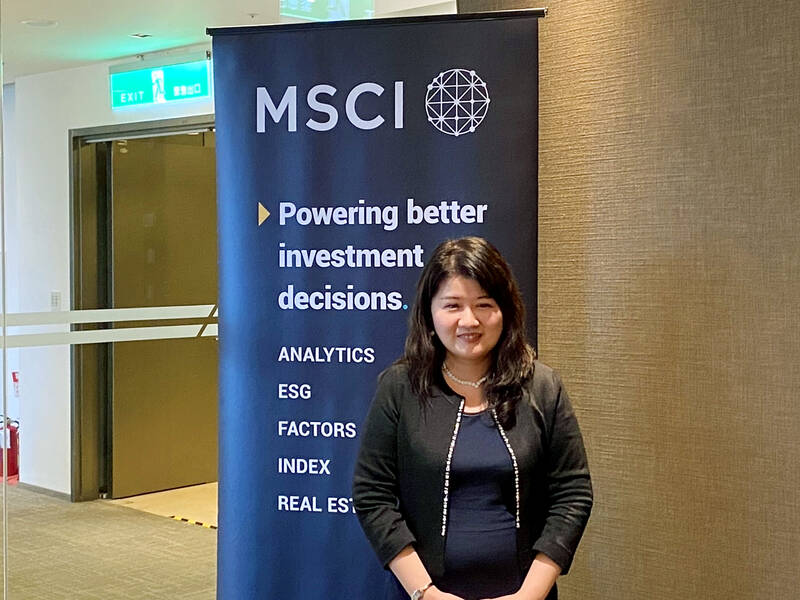Global index provider MSCI Inc cut Taiwan’s weighting in two of its major indices, but raised it in a third.
The nation’s weighting in the MSCI Emerging Markets Index, which is closely watched by foreign institutional investors, was lowered by 0.17 percentage points to 14.66, while its weighting in the MSCI All-Country Asia ex-Japan Index was cut by 0.19 percentage points to 16.59 percent, an MSCI statement released yesterday said.
Taiwan’s weighting in the MSCI All-Country World Index was raised to 1.62 percent from 1.61 percent, the statement said.

Photo: Wu Chi-lun, Taipei Times
In the MSCI Emerging Markets Index, China gained the biggest increase of 0.44 percentage points in weighting, ahead of India with a hike of 0.08 percentage points, while Brazil was given the steepest cut of 0.19 percentage points in weighting, followed by Taiwan with its 0.17 percentage points reduction, MSCI said.
Earlier in the day, MSCI said it had added two Taiwanese tech stocks to the MSCI Global Standard Indexes after its latest index review.
One of the stocks was Global Unichip Corp (GUC, 創意電子), an application-specific integrated circuit design company that is a subsidiary of contract chipmaker Taiwan Semiconductor Manufacturing Co (TSMC, 台積電), while the other was contract electronics maker Wistron Corp (緯創), MSCI said.
Winstron and GUC had been removed from the MSCI Global Small Cap Indexes, it said.
With the addition of those two stocks, the number of constituents in the MSCI Taiwan Index rose to 90.
Wistron’s weighting in the MSCI Taiwan Index rose to 0.38 percent, scoring the biggest hike among the index’s constituents, while TSMC’s weighting had the steepest cut of 0.28 percentage points, dropping to 42 percent, MSCI said.
Nine Taiwanese stocks were added to the MSCI Global Small Cap Indexes, including electric machinery supplier Fortune Electric Corp (華城電機), BMW’s Taiwan sales agent Pan German Universal Motors Ltd (汎德永業), power management solutions provider Phihong Technology Co (飛宏科技), Shihlin Electric & Engineering Corp (士林電機) and communication services provider Unizyx Holding Corp (合勤控股).
The other four were electronics component maker Waffer Technology Corp (華孚科技), IC testing interface provider WinWay Technology Co (穎崴科技), restaurant chain owner Wowprime Corp (王品) and Yankey Engineering Co (洋基工程).
In addition to GUC and Wistron, MSCI has also removed office automation device supplier Aurora Corp (震旦行) and food brand Taisun Enterprise Co (泰山企業) from the MSCI Global Small Cap Indexes.
The adjustments are scheduled to take effect after the stock market closes on May 31, MSCI said.
MSCI index reviews are conducted in February, May, August and November each year.

POWERING UP: PSUs for AI servers made up about 50% of Delta’s total server PSU revenue during the first three quarters of last year, the company said Power supply and electronic components maker Delta Electronics Inc (台達電) reported record-high revenue of NT$161.61 billion (US$5.11 billion) for last quarter and said it remains positive about this quarter. Last quarter’s figure was up 7.6 percent from the previous quarter and 41.51 percent higher than a year earlier, and largely in line with Yuanta Securities Investment Consulting Co’s (元大投顧) forecast of NT$160 billion. Delta’s annual revenue last year rose 31.76 percent year-on-year to NT$554.89 billion, also a record high for the company. Its strong performance reflected continued demand for high-performance power solutions and advanced liquid-cooling products used in artificial intelligence (AI) data centers,

SIZE MATTERS: TSMC started phasing out 8-inch wafer production last year, while Samsung is more aggressively retiring 8-inch capacity, TrendForce said Chipmakers are expected to raise prices of 8-inch wafers by up to 20 percent this year on concern over supply constraints as major contract chipmakers Taiwan Semiconductor Manufacturing Co (TSMC, 台積電) and Samsung Electronics Co gradually retire less advanced wafer capacity, TrendForce Corp (集邦科技) said yesterday. It is the first significant across-the-board price hike since a global semiconductor correction in 2023, the Taipei-based market researcher said in a report. Global 8-inch wafer capacity slid 0.3 percent year-on-year last year, although 8-inch wafer prices still hovered at relatively stable levels throughout the year, TrendForce said. The downward trend is expected to continue this year,

Vincent Wei led fellow Singaporean farmers around an empty Malaysian plot, laying out plans for a greenhouse and rows of leafy vegetables. What he pitched was not just space for crops, but a lifeline for growers struggling to make ends meet in a city-state with high prices and little vacant land. The future agriculture hub is part of a joint special economic zone launched last year by the two neighbors, expected to cost US$123 million and produce 10,000 tonnes of fresh produce annually. It is attracting Singaporean farmers with promises of cheaper land, labor and energy just over the border.

A proposed billionaires’ tax in California has ignited a political uproar in Silicon Valley, with tech titans threatening to leave the state while California Governor Gavin Newsom of the Democratic Party maneuvers to defeat a levy that he fears would lead to an exodus of wealth. A technology mecca, California has more billionaires than any other US state — a few hundred, by some estimates. About half its personal income tax revenue, a financial backbone in the nearly US$350 billion budget, comes from the top 1 percent of earners. A large healthcare union is attempting to place a proposal before